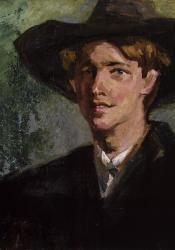The Soldier, Rupert Brooke
The Soldier was written in 1915, just a year after the assassination of Archduke Franz Ferdinand and shortly after the beginning of the first world war. The poem is religious in its undertones—evoking evil, the eternal mind, heaven—which seemed to contradict Rupert Brooke’s own spiritual beliefs at the time as he was openly a nonbeliever (Stallworthy 193). Brooke wrote The Soldier after volunteering in the British armed services where he was commissioned to serve in the Royal Navy, and the religious undertones of the poem are remesient of the idea of combat gnosticism (Campbell). As the saying goes, “There are no atheists in foxholes.” When the bombs start falling, everyone prays to something, but perhaps Rupert Brooke had something else in mind in his word choice. The religious undertones in The Soldier are framed in a very specific way, a nationalistic way.
The Soldier is, thematically, a depiction of the bond a soldier has with his homeland—more specifically, the bond a British soldier has with Great Britain. What separates Brooke’s poem from later poems that emerged from the Great War is its sense of optimism. Although most people fear death, the soldier in this poem appears content, even welcoming of death. By Brooke’s romanticisation of England, referring to his homeland as an English heaven, he creates a sense of a “good death” being when one dies in the service of their country. The sentiment of this poem is the target of Wilfred Owen's later criticism of war, so the saying goes; Dulce et decorum est pro patria mori, or, It is sweet to die for one’s country.
Of course, the ironic thing about this poem is that Rupert Brooke would die in uniform but the details surrounding his death are less than romantic. He was bitten by a bug and died of blood poisoning. That did not stop Churchill from exploiting Brooke’s death and poem to galvanize the youth into a lust for war, framing it as a “heroic sacrifice” (Bristow 663).
Brooke is quoted to have said to a friend while awaiting orders to disembark to fight the Turkish army: “I’ve only two decent reasons for being sorry for dying—several against—I want to destroy some evils, and cherish some goods” (Bristow 663).
Rupert Brooke’s feelings on the nature of the world is clear, and there is a clear good (an English heaven). There is also a clear evil, the Turkish, or any opposed to the English cause. The Soldier ties in to the theme of this timeline by illustrating the mindset of nationalism in a way not often considered. Often, especially with regards to events like the Jan. 6th insurrection, it is easy to simply paint the insurrectionists with a broad brush of hate, as it seems like their actions must have been motivated by hatred. While that may be so, it is important to consider where that hatred stems from and why it is targeted at what it is targeted at. That misplaced hatred of “the other”, who taints the otherwise beautiful and pure homeland, may originate from a place of over-romanticisation—like what is shown in The Soldier, and how it romanticises the English heaven.

